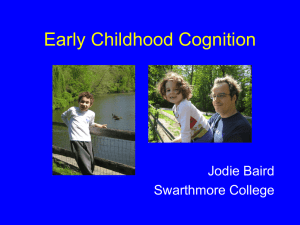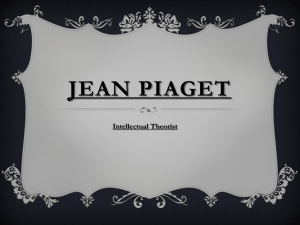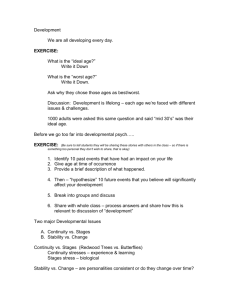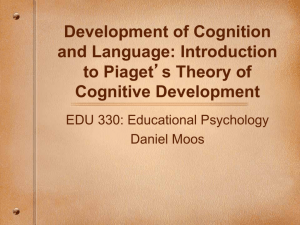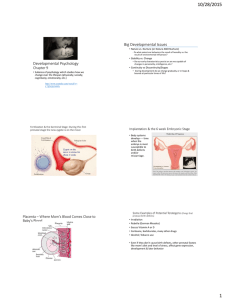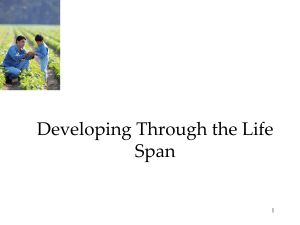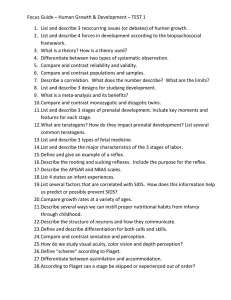Unit 9: Developmental Psychology
advertisement
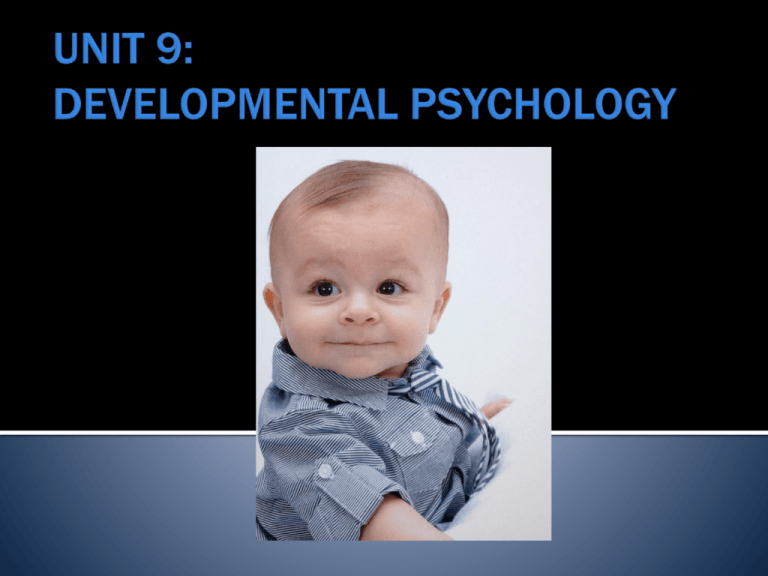
Developmental psychology Nature versus nurture Continuity and stages Stability and change Conception Zygote Embryo Fetus Placenta Teratogens Fetal alcohol syndrome (FAS) Reflexes Habituation Brain development Maturation Motor development Learning to walk Infantile amnesia Cognition Jean Piaget Schema https://www.youtube.com/watch?v=O1iqdHgIAig Assimilation Accommodation Sensorimotor Stage Object permanence ▪ “out of sight, out of mind” https://www.youtube.com/watch?v=NCdLNuP7OA8 Sensorimotor Stage Object permanence ▪ “out of sight, out of mind” Sensorimotor Stage Object permanence ▪ “out of sight, out of mind” ▪ https://www.youtube.com/watch?v=NCdLNuP7OA8 Preoperational Stage Conservation (lack this) Preoperational Stage Conservation Preoperational Stage Conservation https://www.youtube.com/watch?v=gnArvcWa H6I HOLOGRAPHIC SPEECH 1 year old “Ball” TELEGRAPHIC SPEECH 2 years old “Want Ball”/”Where Ball” Egocentrism Theory of Mind Lev Vygotsky Concrete Operational Stage Understand Conservation Math transformations ▪ 8+4=12 ▪ 12-4=8 Formal Operational Stage Abstract concepts (If this, then that) COGNITIVE DEVELOPMENT PIAGET’S THEORY AND CURRENT THINKING COGNITIVE DEVELOPMENT PIAGET’S THEORY AND CURRENT THINKING COGNITIVE DEVELOPMENT PIAGET’S THEORY AND CURRENT THINKING COGNITIVE DEVELOPMENT PIAGET’S THEORY AND CURRENT THINKING COGNITIVE DEVELOPMENT PIAGET’S THEORY AND CURRENT THINKING Influential theory Development is more continuous Larger emphasis on social factors Children respond better to positive instructions Vygotsky Zone of proximal development Autism Stranger anxiety Attachment Body contact ▪ Harry Harlow’s Familiarity ▪ Critical period ▪ Imprinting ▪ Sensitive period ▪ ▪ https://www.youtube.com/watch?v=_O60TYAIgC4 https://www.youtube.com/watch?v=FM7fT4JLJ7Y studies Psychologists Harry Harlow and Margaret Harlow raised monkeys with two artificial mothers—one a bare wire cylinder with a wooden head and an attached feeding bottle, the other a cylinder with no bottle but covered with foam rubber and wrapped with terry cloth. The Harlows’ discovery surprised many psychologists: The infants much preferred contact with the comfortable cloth mother, even while feeding from the nourishing mother. Monkeys raised with artificial mothers were terror-stricken when placed in strange situations without their surrogate mothers. Ainsworth’s “strange situation” Secure attachment Insecure attachment Temperament Easy, difficult & slow to warm up babies Erikson’s Basic trust Early deprivation of attachment Disruption of attachment Does day care affect attachment? Self-concept Self-esteem Self-awareness Parenting styles (Baumrind) Authoritarian Permissive Authoritative Correlation causation versus Differences in child-rearing from culture to culture GENDER DEVELOPMENT THE NURTURE OF GENDER Experience and brain development Experience and brain development Experience and brain development Experience and brain development Experience and brain development How much credit (or blame) do parents deserve? Peer influence Adolescence PHYSICAL DEVELOPMENT Piaget’s formal operations Lawrence Kohlberg Preconventional morality Conventional morality Postconventional morality Moral Moral feeling action Forming an identity Identity Social identity Intimacy Parent and peer relationships Emerging adulthood Physical changes in middle adulthood Menopause Physical changes in later life Life expectancy Sensory abilities Health Dementia and Alzheimer’s Disease Recall versus recognition Prospective memory Recall versus recognition Prospective memory Cross-Sectional Evidence Cross-sectional study Longitudinal Evidence Longitudinal study It all depends Crystallized intelligence Fluid intelligence Well-being Death and dying DABDA across the life span BIOPSYCHOSOCIAL INFLUENCES ON SUCCESSFUL AGING BIOPSYCHOSOCIAL INFLUENCES ON SUCCESSFUL AGING BIOPSYCHOSOCIAL INFLUENCES ON SUCCESSFUL AGING BIOPSYCHOSOCIAL INFLUENCES ON SUCCESSFUL AGING Death of a spouse most difficult to deal with Facing death with dignity and opennes helps people complete life cycle with a sense of meaninfulness Elizabeth Kubler-Ross’s theory of the stages of dying Denial, Anger, Bargaining, Depression, Acceptance (DABDA) Nature versus nurture Continuity and stages Stability and change CONTINUITY AND STAGES CONTINUITY AND STAGES CONTINUITY AND STAGES CONTINUITY AND STAGES
